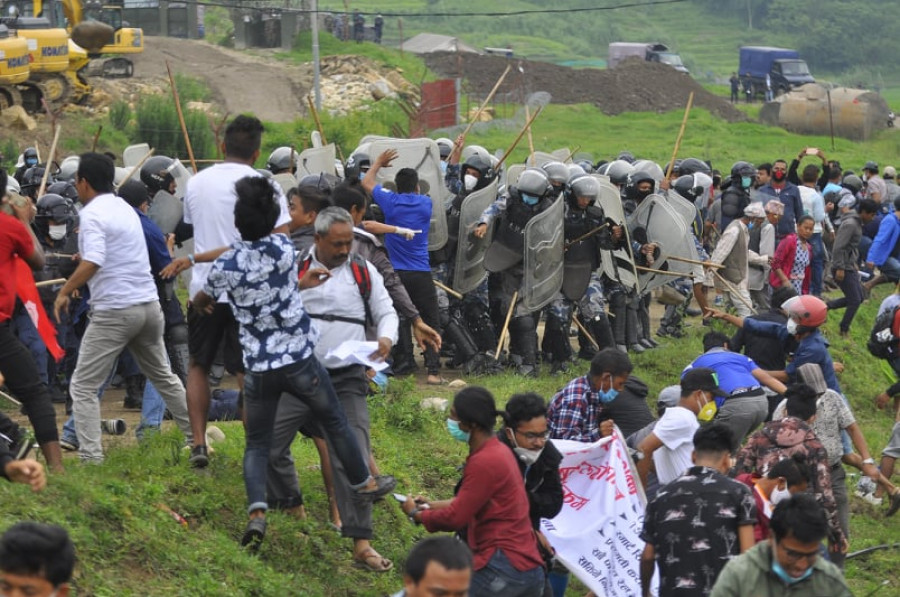Editorial
Listen to Khokana
The government can’t dislocate thousands of people from their indigenous habitat in the name of development.
On Saturday, the lush green fields of Sudol witnessed an unusual eruption of protests and violence. Located next to the historical-cultural Khokana town in Lalitpur, the fields have been the grain basket for the local Newars for centuries. But the future holds uncertain for the locals as the Kathmandu-Nijgadh expressway is set to cut through the fields. The locals, who had gathered there to plant paddy en masse to protest the expressway project and to save their lands got tear-gassed and baton-charged. What an irony that the government of an agricultural country that celebrated National Paddy Day just last week didn’t think twice before getting the police to rain batons on the industrious farmers.
But beyond the obvious irony is a dangerous modus operandi that thrives on bulldozing the lives, livelihoods, cultural heritage and history of an indigenous community that comes in the way of a poorly imagined development plan. Development is a necessary monster for sure, but it needs to be tamed. No conscientious authority can think of eliminating a historically and culturally significant site such as Khokana by imposing one development project after another: the expressway, Outer Ring Road, Bagmati Corridor, satellite city and high tension power line. But they did. And the public is made to believe that the locals are so greedy and adamant that they wouldn’t sacrifice their little homes and hearths for a development project of national pride.
The projects risk devastating the livelihoods of the locals, considering the pittance they get as compensation for what they are forced to forgo. Naturally, the locals have discarded the compensation and rightfully continue to till the land. The authorities, meanwhile, claim that the locals have been offered compensation and that they should just take the money and leave. What the authorities fail to understand is that the locals have no moral compulsion to take the money offered without even being consulted. If the locals have to be uprooted for a project of national importance, then they are the ones who should be deciding the terms. Instead, the authorities, devoid of the humility to listen to the locals who have to begin a new life altogether in a new place, consider corporeal violence as the only way out of the imbroglio as was evident on Saturday.
The very idea that a community can be bullied into forfeiting its land for money reeks of the contemporary liberal capitalist tendency that has no regard whatsoever for indigenous people's rights. The loss of land is also a loss of home. Home certainly does not only mean the four walls that make an enclosure: It means lived experience, community feeling, indigenous built environment, narratives and history. Severing a community’s ties to home means exiling it from the lineage of history itself. No logic of development can justify such a forced exile.
Furthermore, beyond the immediately visible structures of the scenic Khokana town lie the intangible heritages that are deeply rooted in the cultural lives of the locals. A country that trashes its past does not hold the moral authority to imagine a future for itself. Rather than the locals, it is the bureaucratic-political system that justifies the uprooting of an indigenous community from its homeland to make way for a development project that needs to be displaced. A project built on the ruins of the cultural-historical heritage of a community is a blot on the conscience of the entire country. The Khokana case will set a precedent for future conflicts between development and conservation as well. So citizens must make sure to let the government know that its developmental monster can’t flatten everything on its way and that it is the monster, and not the indigenous people, who should be looking for an alternative way.
***
What do you think?
Dear reader, we’d like to hear from you. We regularly publish letters to the editor on contemporary issues or direct responses to something the Post has recently published. Please send your letters to [email protected] with "Letter to the Editor" in the subject line. Please include your name, location, and a contact address so one of our editors can reach out to you.




 18.12°C Kathmandu
18.12°C Kathmandu














